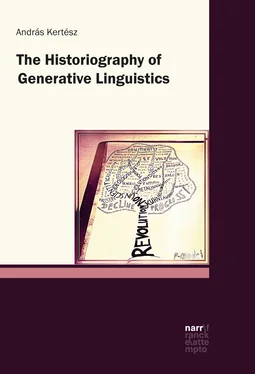ChomskyChomsky, Noam and HalleHalle, Morris’s work is coherent with Chomsky’s previous findings. It supplements Chomsky’s approach to syntax with a theorytheory of phonologyphonology. Some of its main tenets are:1
The neo-Bloomfieldianneo-BloomfieldianBloomfieldian term ›phonemicsphonemics‹ was rejected and ›phonologyphonology‹ was used in its place.
Phonology is an autonomous component of grammargrammar.
Underlying phonemic sequences are transformed to phonetic representations that are realized by speakers.2
The term ›phonemephoneme‹ was rejected and substituted by bundles of binary features such as [+voiced], [-voiced].
2.3.1 KuhnianKuhnian revolutionrevolutionKuhnian
MurrayMurray, Stephen O. (1994: 238) proposes the following hypothesis:
| (T15) |
It is generative phonologyphonology that ignited a scientificscientific revolution.evolutionevolutionscientific |
HymesHymes, Dell & FoughtFought, John (1981) [1975], MurrayMurray, Stephen O. (1994), HarrisHarris, Randy Allen (1993a) and KoernerKoerner, E.F. Konrad (1989) all state that Syntactic Structures Syntactic Structures as the direct continuation and syntactic extension of the work of Zellig S. HarrisHarris, Zellig S. did not bring about significant intellectual innovations and thus never provoked resistance in neo-Bloomfieldianneo-Bloomfieldians. Based on his investigations, which we have already reported on in Section 2.1.2.6.1, Murray (1994: 238) concludes that »[w]hat outraged neo-Bloomfieldians was not the theorytheory of syntax, but the dismissal of phonemicsphonemics« and that the disagreements in the 1950s and 60s reached their culmination in arguments around phonologyphonology rather than syntax. According to Murray, the dismissal of phonemics in linguistics was a much more provocative step than anything that ChomskyChomsky, Noam could have said about syntax or the conflict between behaviorismbehaviorism and mentalismmentalism (Harris is of a similar opinion, cf. Harris 1993a: 59–61). He makes reference to Archibald HillHill, Archibald A.’s famous memoir in which Hill writes that he had got on well with transformationaltransformation grammarians until his »darling, the phonemephoneme« (Hill 1980: 75) was attacked. Murray draws a counterfactual conclusion: if this interpretation is correct and if one accepted KuhnKuhn, Thomas S.’s approach, then it would be better to deem HalleHalle, Morris (1959) and Chomsky & Halle (1968) revolutionaryrevolutionary instead of Syntactic Structures or Aspects Aspects (Murray 1994: 238–239). Consequently:
| (SP15) |
If we were to accept the terms ›scientificscientific revolution‹revolutionscientific and ›paradigm‹paradigm with respect to generative phonologyphonology as the basic terms of the historiographyhistoriography of generative linguistics in the framework of Kuhn,Kuhn, Thomas S. then its central hypothesis would be (T15). |
2.4 ›Lectures on Government and Binding‹ (ChomskyChomsky, Noam 1981)
2.4.0 Background information
The significance of Government-BindingGovernment and Binding, Theory of Theory (ChomskyChomsky, Noam 1981), later called the Theory of Principles and ParametersPrinciples and Parameters, Theory of (Chomsky & LasnikLasnik, Howard 1993), is as follows:
It seems to have provided a framework for the solution of the logicallogic problem of languagelanguage acquisition already raised in ChomskyChomsky, Noam’s SkinnerSkinner, B.F.-review and re-formulated in Aspects Aspects .1 The problem is rooted in the observation that children who are learning their mother tongue experience datadata which are insufficient for the acquisition of the grammargrammar, but in spite of this they acquire the grammar of their language quite easily and in a relatively short time. How can it happen that despite this poverty of stimulus , they acquire the grammar of their language? To put it simply, the core of the argument is this:Children learn the grammargrammar of their languagelanguage in a relatively short time.The languagelanguage datadata which children experience and which serve as the input for the acquisition of grammargrammar are insufficient for acquiring the grammar.If the languagelanguage datadata which serve as the input for the acquisition of grammargrammar are not sufficient for acquiring the grammar and children learn the grammar of their language in a relatively short time, then children are born with innate grammaticalgrammatical knowledge.2Therefore, children are born with innate grammaticalgrammatical knowledge.But then, the next question is: what does this innate knowledge consist of? In the Theory of Government and Binding, instead of ›languagelanguage acquisition device‹, which was applied in Aspects Aspects , the term ›language faculty‹ was introduced. The language faculty is assumed to be part of the mind and enables the child to acquire the grammargrammar of her language on the basis of linguistic experience.3 While induction does not provide an explanation for the solution of the problem, the solution proposed by the Theory of Principles and ParametersPrinciples and Parameters, Theory of (Government-BindingGovernment and Binding, Theory of Theory) says that children are born with the principles of universal grammar associated with parameters and it is these parameters that are set during the process of language acquisition on the basis of the linguistic datadata that they experience in their environment.4
It explains the syntactic properties of individual languageslanguage by setting the parameters associated with universal principles. In this way, it is able to account for both the universal regularities of the language faculty and the differences between the syntactic peculiarities of individual languages.5
The theorytheory presupposes the modularitymodular hypothesis which says that knowledge of languagelanguage consists of relatively autonomous subsystems interacting with each other. As a consequence of this hypothesis, the theory explains the structure of particular expressions by the interaction of universal principles that belong to different relatively autonomous subsystems of grammargrammar rather than by structure-specific rules.6
»Linguistics […] becomes part of psychology, ultimately biologybiology. Linguistics will be incorporated within the natural sciencesciencenaturals […]«. (ChomskyChomsky, Noam 1986: 27)
2.4.1 Revolution
2.4.1.1 KuhnianKuhnian revolutionrevolutionKuhnian
In the publications of ChomskyChomsky, Noam’s adherents, the Theory of Principles and ParametersPrinciples and Parameters, Theory of is often claimed to be a new paradigmparadigm as the result of a scientificscientific revolutionrevolutionscientific. As a typical example, let us quote GrewendorfGrewendorf, Günther who believes that »[t]he Principle and Parameter approach has permitted many subtle and revolutionaryrevolutionary discoveries over a broad domain of phenomena in a wide range of languageslanguage such that linguistic theorytheory for the first time in its historyhistory came close to its crucial objective of explanatory adequacy« (Grewendorf 2007: 370; emphasis added) and that by a » revolutionary hypothesis it brought about a completely novel view of language acquisition« (Grewendorf 2006: 134; translation by the present author). However, it is not clear in what sense here the term ›revolution‹ is used and what kind of historiographicalhistoriography approach it is part of. Nevertheless, all such occurrences of the term are probably latently applied in a KuhnianKuhnian sense, as Grewendorf (1993: 119) cites KuhnKuhn, Thomas S. and uses the same terminology. Accordingly, the thesis is:
Читать дальше












